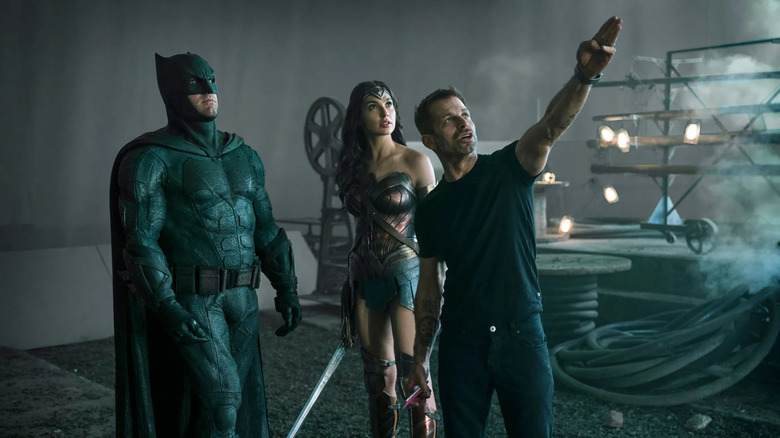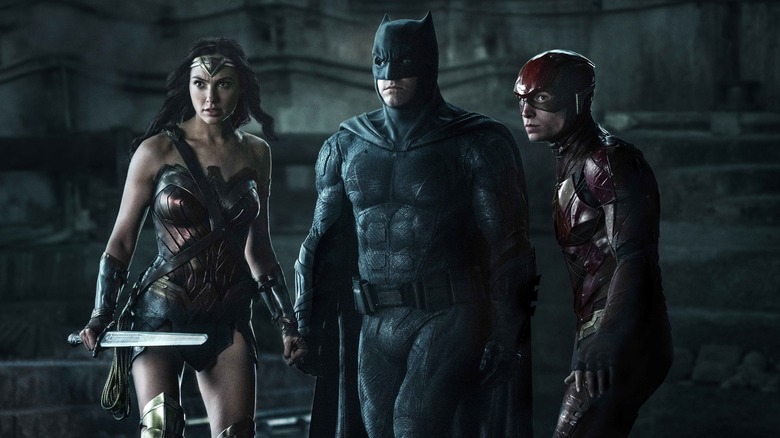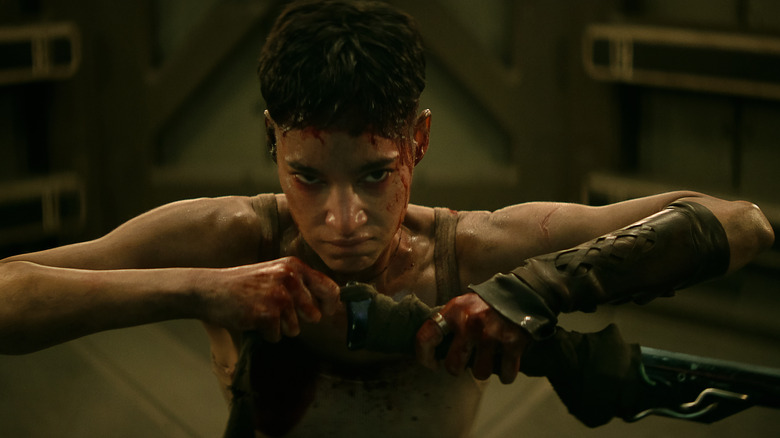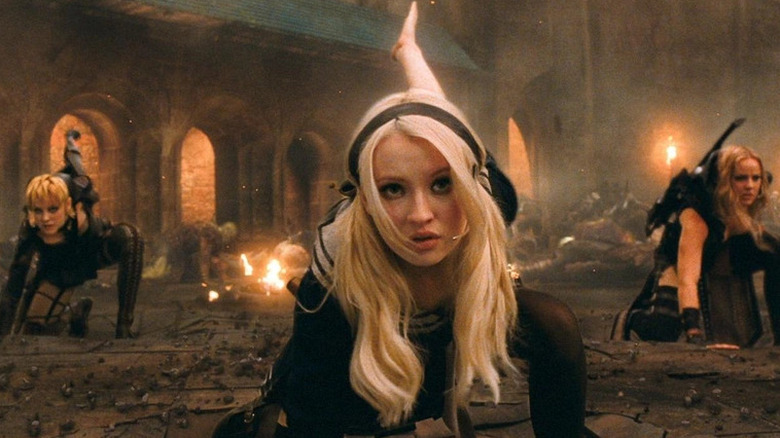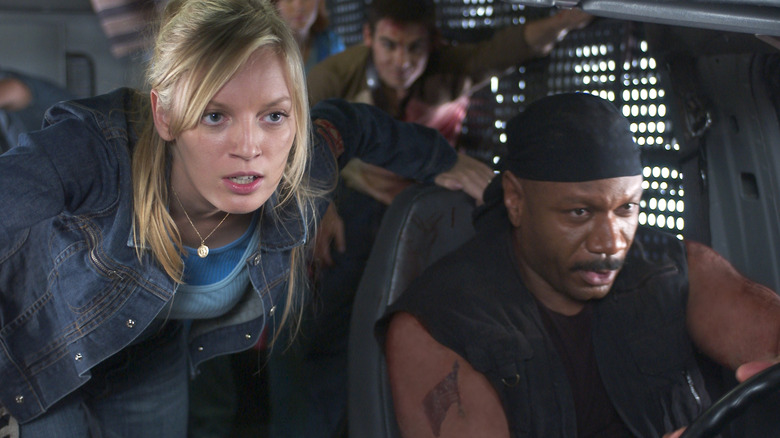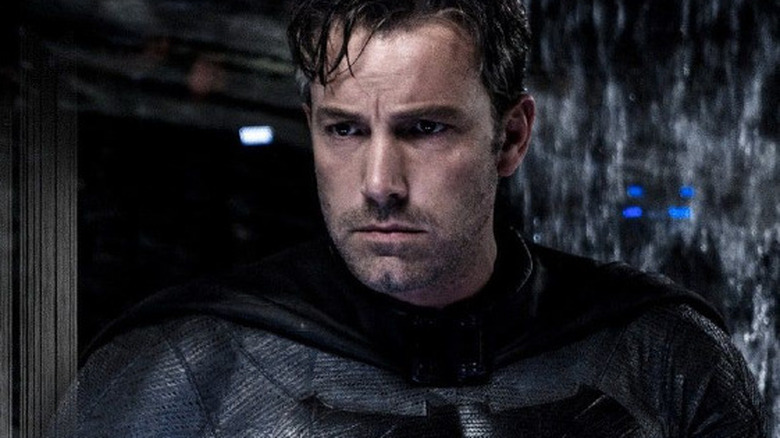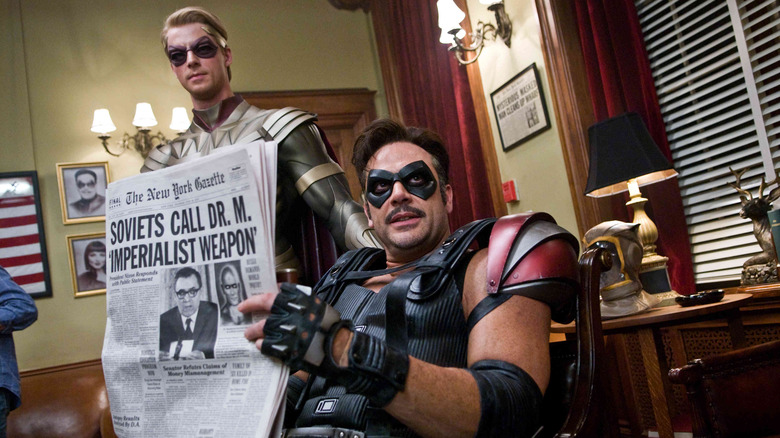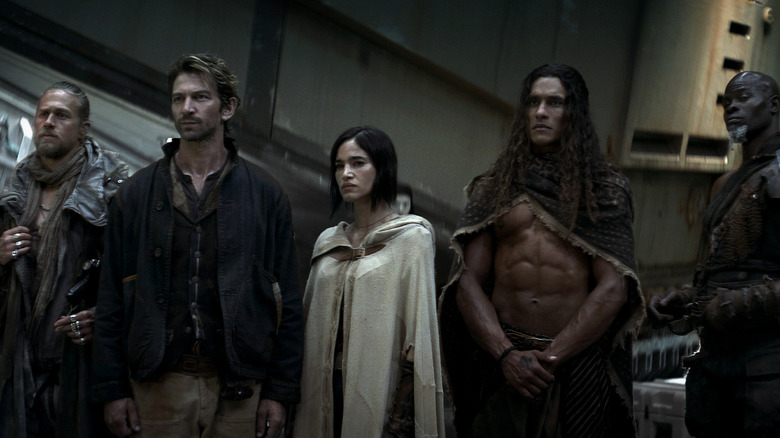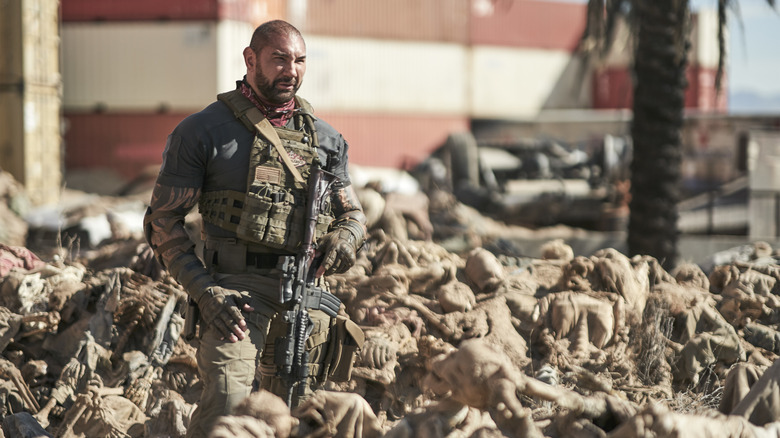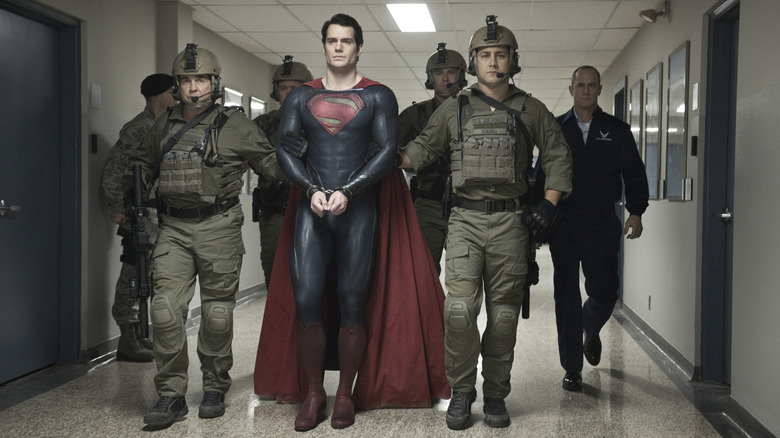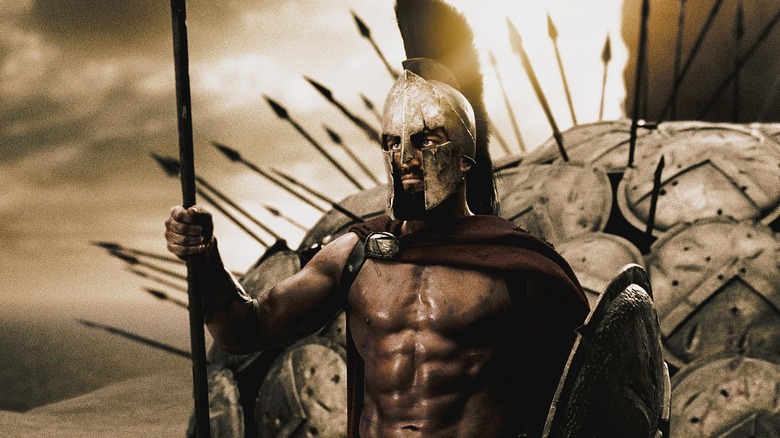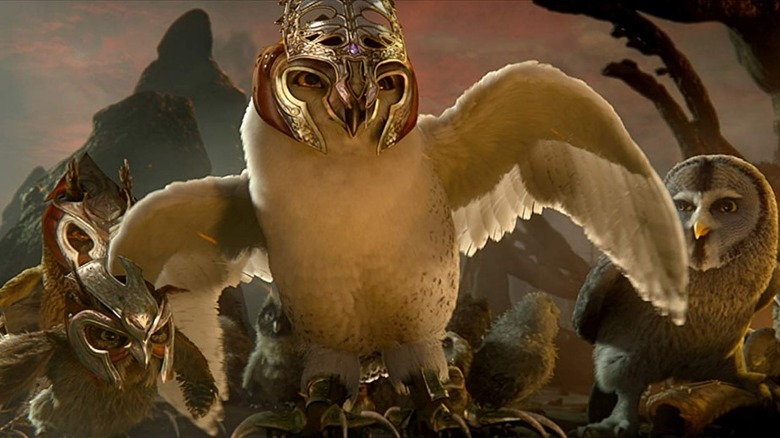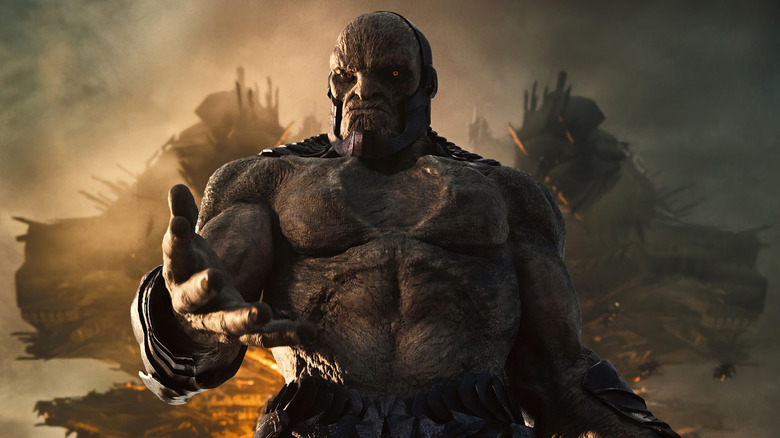Every Zack Snyder Movie Ranked Worst To Best
Zack Snyder remains one of fandom's most divisive directors, best known for his hyper-stylized takes on comic-book worlds. To his haters, he's a grimdark objectivist who just likes to make things look cool with no real understanding of his subjects. To his fans, he's the one guy who gets them, representing their favorite heroes the way they want to see them while indulging in the same power fantasies that draw outsider kids to comics in the first place. He can be surprisingly progressive, casting Polynesian Jason Momoa as Aquaman and nonbinary Ezra Miller as the Flash. He can also seem weirdly retrograde: ask any Persian how they feel about "300."
For most of his career, Snyder has adapted other people's works, a phase he appears ready to step out of as he attempts to create new franchises for Netflix. Whether they come from his mind or his memories of enjoying source material, his movies bear an unmistakable stamp of washed-out (or neon!) colors, slow-motion/fast-motion changes, big heroic deeds, and tragic outcomes. While he's prone to offering different cuts of his movies for home release, those are mostly just longer cuts of the same film, and not counted here, with one major exception that saw first-run release in two drastically different versions that aren't really the same movie at all. Here is the real Snyderverse: all 10 Zack Snyder movies ranked worst to best.
12. Justice League (2017)
Everyone knows that "Justice League" is, at best, maybe half a Zack Snyder movie, heavily rewritten and partly directed by Joss Whedon as Warner Bros. tried to course correct and be more fun like Marvel. Yet Snyder's name remains as solely credited director, and this sort of thing happens in the movie business more than most people think. Since he didn't try to have his name removed and replaced by "Alan Smithee" or another pseudonym, it counts. Frankly, it's a testament to Snyder that the movie's still watchable despite every attempt by Whedon and the studio to aggressively not get or appreciate what he was going for. Moments like Superman slowly turning his head toward the Flash as they both move in Speed Force time, or Wonder Woman foiling the museum robbery, are pure Snyder. Bits like Aquaman crushing on Wonder Woman while secretly under the power of her lasso are much more Whedon.
More glaringly, Whedon clearly doesn't know how to film Henry Cavill's suit in a way that makes it look natural, and his basic lighting exposes the metal plates and cel shading designed to make his muscles look more prominent. Steppenwolf's design is silly, and his ultimate demise makes little sense in context. The only good addition Whedon's cut makes is to show the creation of a Parademon, making their origins a little clearer. On the whole, theatrical "Justice League" isn't much better than many forgettable direct-to-video DC animated movies.
11. Rebel Moon Part Two: The Scargiver
After taking us on a journey through his perverse, fascist take on the "Star Wars" universe in "Rebel Moon Part One," Snyder strands us on, and immediately above, its most boring planet for the needlessly drawn-out climax. First, it has to sink in that the villain they all thought Kora (Sofia Boutella) killed has, in fact, pulled a Palpatine and somehow returned. Then there's an insanely long sequence of harvesting wheat that plays almost like a North Korean communist propaganda film, with all the energy of that interminable roller-skating scene from the disastrous "Heaven's Gate." Finally, the bad guys arrive and it's time to spend an hour or so blowing up their spaceships, one of which is apparently, absurdly coal-powered.
Utterly failing at Hitchcock's rule of suspense, Snyder rarely establishes what the specific mini-goals are before the characters achieve them, so we can never tell how close they are to succeeding or being thwarted. It seems like a foregone conclusion anyway, only to segue directly into a new dangling plot thread to set up yet more movies. To be fair, a third movie, if it happens, has a premise that sounds like more than just a "Seven Samurai" or "Battle Beyond the Stars" ripoff, but why did we have to sit through these first derivative two to get there?
Like every other movie here, it has some striking imagery, but despite some generic, repetitive flashbacks of trauma, never gives us much reason to care about it.
10. Sucker Punch (2011)
One of only two Zack Snyder movies thus far not to be based on any pre-existing story or characters, "Sucker Punch" is a rare example of the director's ambition exceeding his grasp. On paper, it plays like a mash-up of Denis Potter's "The Singing Detective" with "Tank Girl" and whatever anime Snyder caught on Adult Swim. It should be compelling, especially with the fantasy scenes mirroring the real-world exploitation of the female heroes. Sadly, it doesn't play that way. It's the story of an abused woman locked in an asylum where she's abused once again and disassociates into her imagination to help herself escape, literally and figuratively. Sadly the dreams and reality don't connect as well as Snyder seems to think, and it plays like bursts of "stuff that's cool" interspersed with moments of gratuitous meanness. If the point is to indict his own audience, it doesn't come across very well, especially with Scott Glenn's fantasy Wise Man seemingly appearing in the real world to influence events at the very end.
Snyder has a career pattern of adopting the aesthetics of the best comic books without necessarily understanding why they were so special beyond just looking impressive. If he is as smart as he wants to look and "Sucker Punch" is supposed to be an indictment of his own aesthetic, then it's a brave choice that he does not fully pull off.
9. Dawn of the Dead (2004)
Zack Snyder's feature film directorial debut essentially set him an impossible task: remake one of the most beloved horror films of the '80s (arguably the greatest zombie movie of all time), even though nobody in the moviegoing public was clamoring for anybody to do so. Better yet, remake a movie that itself was originally a sequel, but without the predecessor to set things up. Two things worked in his favor, i.e. the general public's overall familiarity with zombies as well as a script by James Gunn, who was riding a "Scooby Doo" hot streak as a writer.
Merely by not sucking, Snyder's "Dawn of the Dead" felt like a mini-triumph. Sarah Polley is an inspired choice for a lead, and since the real world hadn't yet tired of shopping malls the setting remained potent. The movie's most memorable for its brutal ending and the zombie baby, both aspects that Snyder would heavily revisit a decade-and-a-half later. In what was an extremely controversial move at the time, "Dawn of the Dead" introduced running zombies, making each one more of an individual threat rather than shambling hordes who can only overwhelm en masse. Some fans may have thought they would hate the change, but running zombies have continued to recur in horror fiction thereafter, even to the point of being teased in the next "Walking Dead" spinoff.
8. Batman v Superman: Dawn of Justice (2016)
If we were counting Blu-ray-exclusive director's cuts, "Batman v Superman" would rank higher. Unfortunately, in trimming it down for theatrical, Zack Snyder had to lose some of the nuances that helped explain broader strokes. In answering online fan criticisms over "Man of Steel," Snyder presented Superman (Henry Cavill) and Batman (Ben Affleck) as two crimefighters with very different philosophies: the George Lakoff-style nurturing mother versus stern father. Serving as a meta-critique of social media, the movie offers up a Mark Zuckerberg-style Lex Luthor (Jesse Eisenberg) who antagonizes the two heroes against each other by harping on negative details (Superman didn't save enough people!), creating a false narrative (Batman's getting people killed in prison!), and ultimately threatening the women in Superman's life. Meanwhile, the heroes who could have just talked things out insist on believing the worst based on what they hear in the media, ultimately attempting to murder each other.
The theatrical cut sadly ditched the subplot that made clear Luthor was having Batman's captured criminals killed in prison. This simultaneously made Batman look less likable and Luthor less effective. The reveals of future Justice Leaguers into the plot felt pretty forced, though Snyder's casting choices seemed solid across the board ... before Ezra Miller melted down, anyway. Gal Gadot, Jason Momoa, and Ray Fisher are still impeccable. Regardless, most fans agreed that Ben Affleck rose to the occasion as angry Batman, and his comics-accurate costume remains an all-timer.
7. Watchmen (2009)
Alan Moore and Dave Gibbons' 12-issue miniseries "Watchmen" is often called the "Citizen Kane" of comics. Densely layered and packed with levels of social and comic-specific satire, it seemed unfilmable for years. Not that Hollywood didn't try, with Terry Gilliam and Paul Greengrass both attached at different times. However, while prior attempts tried to update the story to the present day, Zack Snyder simply opted to do it literally, as set in an alternate-reality 1985. As would become standard practice for the director, he used actual comic-book frames for storyboards, literally reproducing the colors. While he didn't necessarily include all of Moore's layers of meaning, his movie would deconstruct movies like the Joel Schumacher Batman films.
Snyder's casting was as near-perfect as it would later be for the Justice League, with particularly outstanding work from Jackie Earle Haley as psychotic vigilante Rorschach and Billy Crudup as the disengaged demigod Dr. Manhattan. Condensing the narrative was inevitable, forcing a controversial change to the ending that could better fit within an under three-hour runtime. The four-hour "Ultimate Cut," which also includes animated sequences, is both the best version and a frustration. Given six hours, Snyder could perhaps have added everything, including the book's climactic alien squid.
6. Rebel Moon Part One: A Child of Fire
A pure slice of Snyder id, "Rebel Moon: Part One – A Child of Fire," even in its initial PG-13 initial release, feels like the fever dream of a teenager who just watched "Star Wars," cranked up a Megadeth album, and passed out in a Mountain Dew sugar coma. Everything Snyder does that people love and hate is cranked to the max: lots of slow-motion, motivational slogans as dialogue, shallow focus (literally and figuratively), and perhaps needlessly perverted villains. There's precious little surprise to its "Seven Samurai" in space script, reminiscent of 1980's "Battle Beyond the Stars," but it has a constant sense of "how far is he going to push it?" every time a new planet or flashback sequence appears.
Like almost every other Zack Snyder movie, this is the story of a team getting together to fight an existential evil force representing either chaos, bureaucracy, or some combination of the two. In this case, it's Kora (Sofia Boutella), once the forcibly adopted daughter of Nazi-like space general Atticus Noble (Ed Skrein), who rallies a team of warriors and resistance fighters to protect her safe haven on an agrarian world exploited for its crops.
Rather than exists as a mere space opera, what ensues more often than not feels like actual opera, with its choral soundtrack and mood-driven tale following the simplest of plots. One does not watch "Rebel Moon" for the story, but for the visual and sonic immersion.
5. Army of the Dead (2021)
Zack Snyder's second take on zombies is a vastly superior version, with his own brand of social commentary that takes on refugees, immigration, the COVID pandemic, simplistic politics, and consumerism. It also adds his own brand of zombies, this time including boss-level creatures from outer space who armor their heads and possibly cyborgs ... to be delivered in a future sequel. There's even a zombie tiger and — because it's apparently the director's favorite go-to creep out — a zombie baby.
Given a budget the "Resident Evil" movies never had, Snyder offers perhaps the most faithful video-game-inspired zombie movie that isn't actually based on any specific property. The climax is right out of the first "Resident Evil" game, while the Vegas action is straight-up "Dead Rising 2." Creating his own version of a Suicide Squad, Snyder's free to make his heroes as violent and expendable as he feels like. Directing more in the visual likeness of a Jerry Bruckheimer action epic than his own usual comic-book stylings, "Army of the Dead" delivers on all the beats one might hope, though it occasionally still shows up Snyder's limits as a creator of original stories. "Army of the Dead" was supposed to set up its own mini-universe, with an animated spinoff and more, but the zombie-free prequel "Army of Thieves," while a bold step, didn't quite pay off.
4. Man of Steel (2013)
Rebooting Superman as an extreme action thrill ride, Zack Snyder's "Man of Steel" hits the ground running with Russell Crowe's Jor-El flying a dragon through aerial battles, and it doesn't let up from there. Unlike Bryan Singer's "Superman Returns," which tried to connect to the Richard Donner films, Snyder attempts fealty to the aesthetic of the more modern comics, though it's arguable whether or not he was fair to their spirit. Kevin Costner's Pa Kent admonishing young Clark not to use his powers until he's an adult and ready for the responsibility seems reasonable, but came across as unnecessarily mean (and suicidal!) to some. Superman's snapping of General Zod's neck during the climax, despite being more or less what Christopher Reeve's Superman also did, likewise played less well in a post-Marvel world in which movie superheroes killing the villain is no longer the norm. His violence towards a misogynist trucker also echoes "Superman II."
Since the movie is fundamentally an origin story, though, this Superman not being fully formed makes sense. Henry Cavill plays him as an outsider to the world and even himself, while Michael Shannon achieves the near-impossible task of making General Zod thoroughly different from the Terence Stamp portrayal. Snyder imbues young Clark's discovery of his powers with body horror, and his adult challenges with epic scope. Thanks to having Christopher Nolan on hand as producer, Snyder also evolved his fantastical visuals into a more realistic mashup of Terrence Malick and Michael Bay.
3. 300 (2006)
"Dawn of the Dead" may have been his first big hit, but "300" was Zack Snyder's breakthrough and the movie that most sums up everything people love and hate about his vision. Based on Frank Miller's comic-book retelling of the Battle of Thermopylae, Snyder's film used heavy compositing and a mixture of slow-motion and fast-motion — often within the same scene — to recreate the literal look and feel of the artwork rather than a realistic depiction of Sparta. It's framed as a propaganda tale told by a survivor of the battle in order to pump up the newer warriors for battle, which explains the broad exaggerations at play. Every enemy soldier is an inhuman monster, while every Spartan is a perfect He-Man action figure with sculpted abs and power moves.
Since it is, perhaps, the only Snyder comic-book movie to be better known than the actual comics it's based on, the movie version ensconced itself in pop culture with lines like "Tonight we dine in hell!" or "This is Sparta!" Gerard Butler's star turn as Leonidas revived his career and pushed him onto the action A-list, while Lena Headey's willingness to play a queen who engages in intense sex scenes, devious political machinations, and murder prepped her well for "Game of Thrones." As with Paul Verhoeven's "Starship Troopers," not everyone gets that "300" is supposed to be obvious, unreliable propaganda for a relatively toxic society. Perhaps because Snyder can't help making the action look cool even when it's supposed to hurt.
2. Legend of the Guardians: The Owls of Ga'Hoole (2010)
Zack Snyder followed up "Watchmen, " an epic about superheroes being kinky and twisted, with a cartoon about owls. It seemed a counterproductive move, as few members of Snyder's existing fanbase are the type to go to talking animal cartoons, and anyone wanting to see an animated film about owls with their family might be put off by Snyder's name on it. Yet until very recently, it remained his best film. Coming from the producers of "Happy Feet," an equally odd cute animal movie with dark undertones made by a director (George Miller) famous for action, it adapts the books by Kathryn Lasky.
Snyder's movies often deal with the way legends matter in society along with the difference between how they are perceived and what they actually are. In this case, owl society has its own legends about a group of young adopted owls forced to seek help after being kidnapped and sent to an evil owl military school. The voice cast boasts Snyder's most amazing ensemble to date, with Helen Mirren, Sam Neill, Miriam Margolyes, Richard Roxburgh, David Wenham, Geoffrey Rush, Hugo Weaving, Joel Edgerton, and Abbie Cornish. It's also a much better use of 3D than "Man of Steel," where the editing and camera work was too frenetic to let the eyes properly adjust. In the animated world, Snyder created a rich immersion and came close to making a high fantasy epic ... with owls.
1. Zack Snyder's Justice League (2021)
Ignore the aggressive, single-minded fanbase on social media, a significant number of whom might be bots or deliberate troublemakers. "Zack Snyder's Justice League" is the director's true masterpiece and one that deserves his name in the title. A four-hour cut that only exists because Warner Bros. desperately wanted some non-COVID-delayed content during the pandemic, it is a grand, operatic tale of godlike beings hurting from a lost love, brought together as a makeshift family when the middle manager of an alien empire decides to prove himself by finding a lost ultimate weapon. It also caps Snyder's Superman trilogy, which began with birth and death, culminating here in the resurrection.
Ben Affleck finally played a version of Batman who comfortably interacts with and leads other heroes. Ray Fisher made a powerful debut as a Frankensteined demigod Cyborg overwhelmed by his powers. Ezra Miller convinced us all they were just a regular guy fortunate enough to hang with the big guns. Gal Gadot got to play Wonder Woman as a strong mother figure, while Jason Momoa continued to reinvent Aquaman as a cool guy in the public consciousness. Every hero got great moments to play, underlining their loneliness as one-of-a-kind metahumans, as well as awkward first interactions with equals. It ends on a cliffhanger that hints at a dark future, but gives closure to the arc at hand. As in real life, the fact that heroes saved the world doesn't mean more danger won't come.
